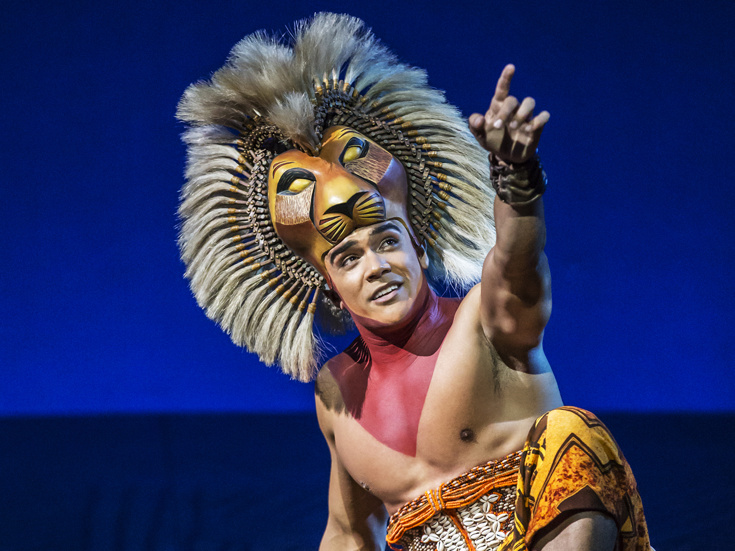Nicholas Afoa, Star of London's The Lion King, on Leaving Sports & Finding a Brotherhood of Simbas

(Photo: Disney)
Nicholas Afoa has only ever been in one professional musical ever and it happens to be that globe-trotting crowd-puller The Lion King. Having first played adult Simba in Australia, the 30-year-old New Zealander has now stepped into the same role at London’s Lyceum Theatre for a year-long run in the West End. Broadway.com caught up with the engaging performer about shifting from sports to the stage and his new life in a familiar show away from home.
You were a successful rugby player back home when an injury necessitated a change of career, and now here you are starring in arguably the biggest musical of all!
Yes, and I feel in a way as if my two passions have come hand in hand in terms of music and sport having both been a huge part of my life. Not everyone gets to make it in both areas, but I’m very lucky that they have both come my way.
Did you feel you had to choose?
Well, I always thought I would make it in the sporting arena but I was playing rugby in Singapore some years ago when I was 23 when my knee gave way underneath me, and that was pretty much the beginning of the end of rugby. I did rehabilitation and tried to come back [to the sport] but it was never really the same, so I needed to make those tough decisions. I had to make a living, so I decided not to play anymore.
What happened next?
I have a very loving and supportive family, especially my parents, and having grown up with this rugby dream, I had always been told, “Look, son. This world in sport is not always a given, and you can be injured and it’s all over.” The thing is, I never thought that would happen to me, so when it did, I was kind of like, “OK, let’s see what else is out there.”
Did you go straight to the stage?
The stage thing didn’t happen right away. I had many years of hardships trying to find out what my next purpose in life was. I went and got a BA in social sciences at university in Auckland [New Zealand] and worked for a while with troubled youth, which was wonderful because it was about giving back. When the opportunity to audition for The Lion King came along, that changed my whole outlook. I never thought it would happen like that.
How did you prepare for your audition?
I had YouTube’d it a million times and seen any scene or song that was available, and I had read a lot about some of the Simbas that had played the part in the past—like Jason Raize, and how beautifully he portrayed the character. I also watched quite a few others and came to see that there are so many different ways to play the role—so many different qualities—that it wasn’t just a carbon cut-out that they wanted. At the end of the day, they wanted the truth. You needed to look good and to be able to sing, but at the top of the list, you needed a certain truth.
What is it about the role that you respond to?
Simba’s journey resonates with everybody, which is why the show has done so well not just in America and England but all over the world. It’s universal and timeless.
Does the experience feel the same here in London as it did back in Australia?
Of course, it’s the same script and the same songs, but the energies are different so in some ways it has felt like an entirely new show. I got tears when I heard the first notes here in London because they reminded me of my friends back home and of my first professional experience in a theater show. But we’ve got a new Nala and Pumbaa, among many other cast changes, so it still feels fresh. After 800 performances, I’m finding new things. It’s great to be able to do that.
Is there a community of past and present Simbas?
It’s funny you say that: a few months after I started, I contacted all the Simbas and acquainted myself with them. It’s been really nice to connect with people I haven’t ever met but still feel I know because we share a role.
Has any particular advice stuck with you?
Jonathan Andrew Hume was great in allowing me to put a face to the name. We met up a couple of times, and he kept telling me to be gracious with myself and to give myself more time. I was anxious about doing a good job in the West End, and he assured me that they wouldn’t have asked me to come [to London] if they didn’t think I could do it.
Does London now feel like home?
Home will always be New Zealand, but for now, I’m contracted here for a year and after three months, I can already say that I could see myself here for another year or so. My wife and I will at some point decide whether London is a place where we could see ourselves [longterm], but I’m keeping my options open.
How would you characterize your singing voice?
I like to consider myself a crooner and really love Michael Buble and that sort of sound. I’m not quite a classical tenor and can’t hit the Pavarotti notes, but I’m not quite a classical baritone either. I guess you could call me a bari-tenor.
Do you see yourself ever returning to professional sports?
I don't think given the impact and contact that come with rugby that my body—and especially my knee—could withstand that pressure. For now, I’m enjoying just running on a stage without people trying to tackle me; I like it like that.